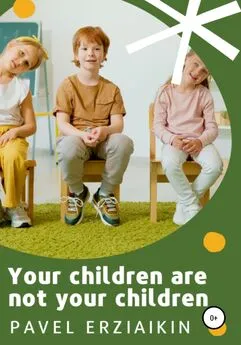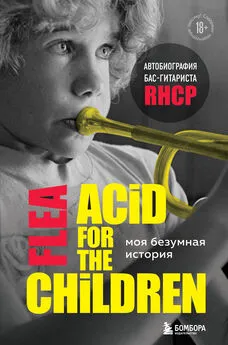Павел Эрзяйкин - Your children are not your children
- Название:Your children are not your children
- Автор:
- Жанр:
- Издательство:неизвестно
- Год:2022
- ISBN:нет данных
- Рейтинг:
- Избранное:Добавить в избранное
-
Отзывы:
-
Ваша оценка:
Павел Эрзяйкин - Your children are not your children краткое содержание
Your children are not your children - читать онлайн бесплатно ознакомительный отрывок
Интервал:
Закладка:
§ 2.1. Supporting Point
Parents, who are happy living their own private life, are happy if the child begins to live independently and has an inner center, supporting point. Сhildren are responsible for their life and do not need "crutches" in the form of assistance and support from parents. In this case, you, as a parent, know exactly that all the terrible things that scare anxious mothers will never happen to your child, because they have the courage to think with their brains and rely on common sense. You are sure that they will be winners, successful and lucky people, and all that remains for you is to be proud of your child, and you are not even slightly worried about where they live. You know that no matter where they live, it’s the best possible life out of all the opportunities in the world.
There are people who are fine under any conditions. There are people who demand special conditions to live. You have to make your child understand that he or she is the main condition to live. You are alive, then live. If we take the universal purpose of parenthood on a planetary scale, it is the same as that of a lion or a dolphin or a dog: to teach a baby to be responsible for his/her life. This quality doesn’t appear by itself at a certain age – it needs to be formed and created.
You can’t teach responsibility with fear. Fear is a stimulating, not motivating factor, and it works as a temporary measure. Parents are unable to forbid anything. Even if you forbid now, you won’t be able to run after a child for all your life and watch, forbid and control. At that very moment when you are not near, the child will do what he/she wants and you will never know about that. You have taught your child to give "right" answers, you’re calling home and asking: "What are you doing, sonny?" – "Homework," – he’s saying, but in reality he’s watching daily rebroadcast of the movie you forbade to watch yesterday.
Children should have a supporting point to choose themselves what they like and what they don’t like. When there is no such point, children have to rely on what’s "right" and "wrong," but these values are changing constantly. Back then, if you had sex before the wedding, it was a shame. Now if you don’t have sex before the wedding, it’s a shame as well. If you instill the stereotypes about the norm, you make your children vulnerable for the changing world, for assessment. They start believing in the absolute, but then suddenly everything turns head over heels and they get confused.

I am doing homework!..
When children start believing in the absolute assessment, they become silly, dependent, extremely vulnerable and turn into "social sheep" telling their mom, "I’ve seen this chocolate commercial on TV, and I need this chocolate. I can’t live without it!" The life of such children depends on who they will meet today. If they meet a member of a sect, they will become sectarians. If they meet a thief, they will become thieves. If they meet a drug addict, they will become drug addicts. Mothers usually do not see the root of their child’s problems in themselves and lay the blame on school and TV. However, millions of people watch TV and go to school, but not all of them become drug addicts.

Once I talked to the mother of a drug addict. As soon as she entered my office, I told her, "Do you want me to tell you what kind of son you have? Irresponsible, weak-willed and purposeless." – "Yes. How do you know that?" – "Because you are very responsible, decisive and purposeful." If some traits of character are hypertrophied in the mother, the same traits are absolutely atrophied in the child – the child doesn’t need them. You have to delegate something to a child – responsibility or honesty; then, it will become his/her individual quality.
Mothers having no private life start taking it away from children. They are anxious, if their children has eaten, whom they meet, what they are doing, have they had enough sleep. The parents all need to attend my grandma’s courses. Two of her children died of hunger. In our time of abundance, she was absolutely indifferent about my satiety. The child didn’t ask for food; that was good. They called me to have lunch, I refused – "well, if you don’t want to eat, it’s up to you." My granddad prayed to God, they ate and cleaned the table. If I was not in time – I was hungry. So, filling in my stomach became my own problem and responsibility.
Parent responsibility is also to teach children to accept somebody’s opinion, if the children need it themselves, or not to accept, stay independent and uninvolved, knowing that they personally don’t need it. For example, the child comes home from school and says, "The teacher doesn’t like me." Prior to passing a sentence or diagnose, ask the child, why it happens. The inventory begins. It turns out that the teacher doesn’t like the child for some actions. "First, the teacher doesn’t have to like you. She has to teach you. Second, why do you provoke the teacher to start the conflict? Are you defending anything so important to you that you are ready to spoil relationship with the teacher? Do you think it’s worth behaving this way in the future? If it’s worth, then don’t complain. Do I get it right: you spoil the relationship for me to go to school and restore them?"
There are three questions that work magically with children:
The first one: What are you doing now? It gives them an opportunity to realize, where they are, what they are and what their activity is aimed at – a kind of a "stop" signal.
The second one : What do you think?
The third (control) one : When?
Thus, we form responsibility. Children quickly learn to give the "right" answers to parents’ questions, but their individuality isn’t revealed through "right" answers. The first time you ask your children what they think, they will try to say something you’ll like. We ourselves provoke children to lie: say something to your mummy, so that she would calm down; say something to your daddy, so that he would leave you alone.
The most important thing for parents is to ask not waiting for a certain answer: you ask, but you don’t correct. By asking a question, we give children the chance to find the answer themselves. So, what they say doesn’t excite or disappoint us. I have heard the answer and accepted it. Only then, without the external assessment, approval or condemnation, the children’s answer is accepted as their own. "What kind of friends do you have, son?" – "Good friends." – "Why do you think they are good?" and leave him with this answer. If there are no expectations, the child’s answer will be objective; the child will answer himself. Thus children learn their own lessons, which are the most important. When we don’t give answers, children start looking for them inside and, if they confirm that they are right, they gain confidence in themselves, a supporting point. In other words, children gain the courage to use their own brain (to reflect, to create and to manifest) and gain confidence: relying on my own opinion, I’ll get what I want.
You don’t have to answer the question when the answer is obvious. Sometimes children ask just because they remember being praised for that as little kids. They ask only to attract attention, but sometimes because they don’t trust themselves. For example, my daughter enters the kitchen where I am drinking tea. She asks, "Dad, what are you doing?" – "What do you see?" – "You are drinking tea." – "Exactly." And she learns to trust herself in what she sees. When children keep asking about something obvious, it means they are not self-confident.
Because we are arrogant, it takes a lot of time before we start delegating the responsibility for their life to children. At first, we enjoy thinking for them; we like being asked for advice, but then children stop thinking for themselves and we have to save them from various trouble. Despite the fact that we created this situation ourselves, sooner or later it starts being a burden.
Questions
How can I understand that my child is ready for independent life? For example, my son is 16 and he wants to leave home. Are there any criteria helping to forecast what will come out – independence or failure?
Why do you have such a question? You have been watching your child for sixteen years. Haven’t you seen him? Haven’t you kept an eye on him? Have you been enjoying the fictitious image of him? I recommend diagnostics, i.e., to ask him a question, "Why do you want to leave?" However, it will become diagnostics only if parents have no fear, judgment or condemnation. Sometimes the idea to live independently appears not because something is due, but because the person wants to run away from something, for example, to get rid of parental control, to watch TV 24 hours a day.
Examine yourself. Why are you afraid of your child living independently? Maybe you haven’t played dolls enough? Then fear appears: if the child leaves, whose life will be under my control because I don’t have my own life. Jealousy and fear don’t allow you to do diagnostics honestly. The child says: "I want to try to live alone." – "OK. If you fail, come back home."
A wise decision is an adequate decision. It is taken when everything is clear and obvious for parents. The absence of clarity is replaced by the concept "right or wrong," "early or late," "has to be this way or doesn’t have to." Say "stop" to yourself. What kind of person is my child? Does he have his own opinion? Does he use his brain or is he guided? Can he "put his hand to the plough" and bring it to a close? Is he determined? How does he behave having troubles: does he solve them or run away?
My friend was telling me that he bought a house, but his children didn’t want to live in it. They stayed in the apartment in the city. One was 16 years old; the other was ten. Parents were waiting for children to call and ask for advice someday, but it didn’t happen. The father called, "How are you?" – "OK." —"Aren’t you late for school?" – "No." – "Are teachers satisfied with you?" – "They are." – "Are you doing your homework?" – "Yes." So, the father felt that the children don’t need him anymore and paranoia began, "Isn’t it too early for them to live independently? Am I depriving them of childhood, making them carry a burden of adult life?" Who told you that it’s a burden? Your experience? We are jealous of children having their own lives, and this makes us inadequate.
What should I do if it’s obvious that my son can’t cope with the independence he undertook, but he doesn’t ask for help?
Then, it’s only you who think he doesn’t cope. You had an expectation of how it should have been. He should have called you, asked for something and then returned home. However, if he doesn’t ask for help, he can do without you. You notice that it’s difficult for him, but he doesn’t complain. Obviously, he is not in despair, he feels he can cope, keeps on working hard, strains to build his life by himself. It seems to you that he fails, because he doesn’t live the way you want him to. But there are other ways to live. The child only eats Chinese noodles, but he could eat meat at home. Who told you that noodles are bad? If he doesn’t ask for meat, then he likes noodles. Leave him alone.
Читать дальшеИнтервал:
Закладка:







